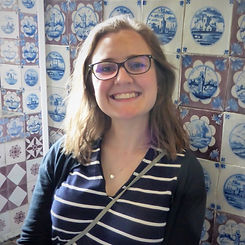Emotion, Embodiment and the Everyday, 1500-1800
A graduate and ECR Conference at the University of Cambridge, 10th December 2021


About Emotion, Embodiment and the Everyday, 1500-1800
Our Conference
In recent decades, the history of emotions has grown into a lively and dynamic field. Historians have been especially interested in how emotional norms were shaped and enforced in past societies, and in how historical actors understood the emotions medically, theologically and philosophically. However, although there has been increasing interest in this area, more work is needed to explore how emotions were experienced, and how emotional ‘norms’ functioned in people’s everyday lives. Our understanding of historical connections between bodies and emotions also requires further development. How exactly were emotions thought to be embodied, and how might this thinking manifest in people’s social and affective lives? How were everyday activities and relationships experienced emotionally? These are two of the many questions which this one-day graduate conference seeks to explore.
This conference spans the years 1500 to 1800, and is seeking 15-minute papers from scholars working on any part of the globe. It is particularly interested in papers with a non-British focus, but those working on Britain are also warmly invited to apply. The conference will be composed of three broad panels: The Emotional Everyday, Spaces of Emotion, and Health, Body and Mind.
Our Programme
8:45-9:00 Introduction
9:00-9:45 Keynote Speaker: Professor Karen Harvey (University of Birmingham): Where Were Everyday Emotions? Britain, 1680-1800
9:45-9:55 Break with refreshments
9:55-11:40 Panel 1: Space and Materiality
Joshua Rushton (University of Leeds): Miracles, Affectivity, and Devotion in Early Modern Italy: The Case of the Madonna of Lendinara,1576-1584
Leonie Price (University of Sheffield): “To Stirre Uppe the Affections”: Inscriptions, Emotions and Materiality in Early Modern England
Ana Howie (University of Cambridge): Evoking Arcadia: Affective Atmospheres and Embodied Experiences in Genoese Gardens and Painting
Lucian Clinch (University of Cambridge): Memory, Emotion, and the Senses in the Mughal Gardens of North India
Dr Christopher Maxwell (University of Warwick): The Materiality of Paranoia in the West Indies, c.1757-1830
11:40-11:50 Break with refreshments
11:50-13:20 Panel 2: Health and Illness
Dr Monica O’Brien (Durham University): The French Pox and Medical Practitioners’ Performance of their Emotions, c.1495-1700
Frances Long (University of York): Tea-parties and Bedsores: Thomas Malkin’s Sickbed
Dr Evelien Lemmens (Queen Mary University London): “All Lies Heavy at My Stomach”: Embodied Emotions in Everyday Digestive Disorders, 1780–1800
Veronika Lahodinski (University of York): Excretions and Early Modern Feelings of Disgust
13:20-14:05 Lunch
14:05-15:50 Panel 3: Gendered Experiences
Dr Jennifer Hardy (Kings College London): “Lett Not My Hart, (As Doth My Wombe) Miscarrie”: Early Modern Reproductive Temperance and Temporality
Amber Vella (University of Leicester): Opening the Body, Guarding the Mind: Regulating Maternal Health During Pregnancy, 1750-1800
Dr Ben Jackson (University of Birmingham): Embodied Masculinity on the Sporting Field: The Gendered, Embodied, and Emotional Experience of Blood Sports in Early Modern England
Dr Marta Manzanares Mileo (University of Cambridge): Embodying Sweetness in Early Modern Spain: A Gendered Perspective
Dr Pradipto Roy (Centre for Studies in Social Sciences, Kolkata): Relocating Madness, Gender and Emancipation in Devotion: An Exploration of Emotions Through Embodied Visceral Experiences of the Women Poet-Saints in Early Modern South Asia
15:50-16:00 Break with refreshments
16:00-17:30 Panel 4: Communicating Emotion
Imogen Knox (University of Warwick): Emotional Responses to Suicidal Intent in British Supernatural Narratives, 1560-1735
Dr Emily Vine and Dr Sarah Fox (both University of Birmingham): Embodying Emotion in Everyday Eighteenth-Century Letters
Rachel Smith (University of Cardiff and Bath Spa University): An Impassioned Emotional Defence: Reframing Motherhood in the Letters of the Canning Family Network, 1760-1830
Dr Naomi Pullin (University of Warwick): “[N]ever Better Accompanied, or Lesse Alone, Th[a]n When Alone”: Solitude and Social Isolation in Early Modern Britain
17:30-18:15 Keynote Speaker: Dr Sally Holloway (Oxford Brookes University): Feeling Foods: Courtship, Edible Gifts, and Emotions in Eighteenth-Century England
18:15-18:30 Closing remarks, followed by an optional drinks reception & dinner
Speakers and Convenors

Professor Karen Harvey
Professorial Fellow and Professor of Cultural History at the University of Birmingham

Dr Sally Holloway
Vice Chancellor’s Research Fellow in History & History of Art at Oxford Brookes University

Emma Marshall
Convenor and PhD Student at the University of York

Ella Sbaraini
Convenor and PhD Student at the University of Cambridge
